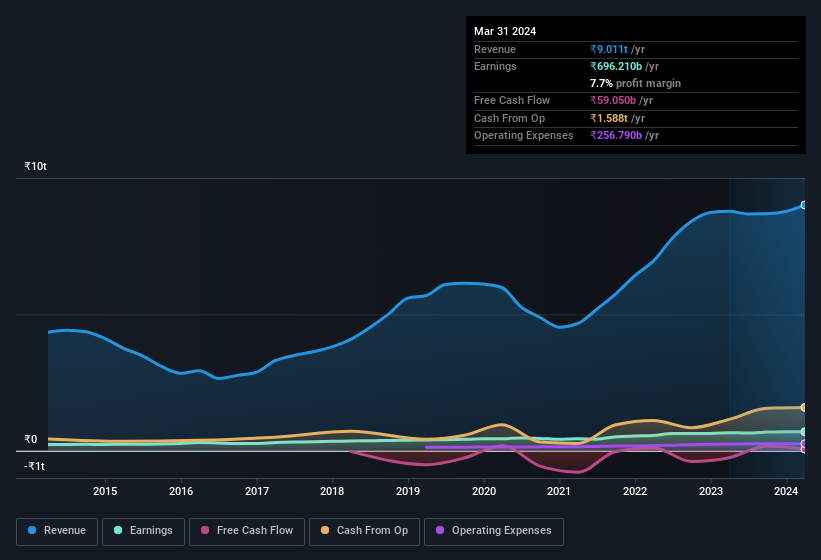- India
- /
- Oil and Gas
- /
- NSEI:RELIANCE
Additional Considerations Required While Assessing Reliance Industries' (NSE:RELIANCE) Strong Earnings

Reliance Industries Limited's (NSE:RELIANCE) robust earnings report didn't manage to move the market for its stock. Our analysis suggests that this might be because shareholders have noticed some concerning underlying factors.
See our latest analysis for Reliance Industries

In order to understand the potential for per share returns, it is essential to consider how much a company is diluting shareholders. Reliance Industries expanded the number of shares on issue by 6.5% over the last year. Therefore, each share now receives a smaller portion of profit. Per share metrics like EPS help us understand how much actual shareholders are benefitting from the company's profits, while the net income level gives us a better view of the company's absolute size. Check out Reliance Industries' historical EPS growth by clicking on this link.
A Look At The Impact Of Reliance Industries' Dilution On Its Earnings Per Share (EPS)
As you can see above, Reliance Industries has been growing its net income over the last few years, with an annualized gain of 60% over three years. And over the last 12 months, the company grew its profit by 5.0%. On the other hand, earnings per share are only up 5.0% in that time. And so, you can see quite clearly that dilution is influencing shareholder earnings.
Changes in the share price do tend to reflect changes in earnings per share, in the long run. So Reliance Industries shareholders will want to see that EPS figure continue to increase. But on the other hand, we'd be far less excited to learn profit (but not EPS) was improving. For that reason, you could say that EPS is more important that net income in the long run, assuming the goal is to assess whether a company's share price might grow.
That might leave you wondering what analysts are forecasting in terms of future profitability. Luckily, you can click here to see an interactive graph depicting future profitability, based on their estimates.
Our Take On Reliance Industries' Profit Performance
Reliance Industries shareholders should keep in mind how many new shares it is issuing, because, dilution clearly has the power to severely impact shareholder returns. Therefore, it seems possible to us that Reliance Industries' true underlying earnings power is actually less than its statutory profit. Nonetheless, it's still worth noting that its earnings per share have grown at 52% over the last three years. At the end of the day, it's essential to consider more than just the factors above, if you want to understand the company properly. If you want to do dive deeper into Reliance Industries, you'd also look into what risks it is currently facing. For example - Reliance Industries has 2 warning signs we think you should be aware of.
This note has only looked at a single factor that sheds light on the nature of Reliance Industries' profit. But there are plenty of other ways to inform your opinion of a company. For example, many people consider a high return on equity as an indication of favorable business economics, while others like to 'follow the money' and search out stocks that insiders are buying. So you may wish to see this free collection of companies boasting high return on equity, or this list of stocks that insiders are buying.
New: AI Stock Screener & Alerts
Our new AI Stock Screener scans the market every day to uncover opportunities.
• Dividend Powerhouses (3%+ Yield)
• Undervalued Small Caps with Insider Buying
• High growth Tech and AI Companies
Or build your own from over 50 metrics.
Have feedback on this article? Concerned about the content? Get in touch with us directly. Alternatively, email editorial-team (at) simplywallst.com.
This article by Simply Wall St is general in nature. We provide commentary based on historical data and analyst forecasts only using an unbiased methodology and our articles are not intended to be financial advice. It does not constitute a recommendation to buy or sell any stock, and does not take account of your objectives, or your financial situation. We aim to bring you long-term focused analysis driven by fundamental data. Note that our analysis may not factor in the latest price-sensitive company announcements or qualitative material. Simply Wall St has no position in any stocks mentioned.
About NSEI:RELIANCE
Reliance Industries
Engages in hydrocarbon exploration and production, oil and chemicals, textile, retail, digital, material and composites, renewables, and financial services businesses worldwide.
Flawless balance sheet established dividend payer.
Similar Companies
Market Insights
Community Narratives



